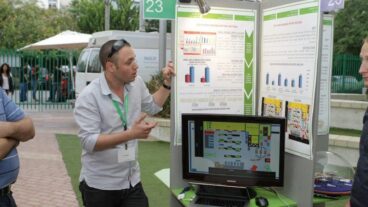Researchers discovered that individuals with the 2-2 form gene were five times more likely to have heart disease than those with the 1-1 form.As a result of new research at the Technion-Israel Institute of Technology, a simple blood test can determine which diabetics carry a gene which gives them 500% more of a chance to develop heart disease. This early detection technique is likely to save untold lives.
The research team, led by Dr. Andrew P. Levy of the Technion Faculty of Medicine, identified the gene that determines which diabetes patients are at greater risk for developing heart disease.
“If we can accurately determine which people with diabetes are at greatest risk for heart disease with a genetic test, there is no telling how many lives we could save with early intervention techniques,” said Levy, who headed the research which was published in the December 4th issue of The Journal of the American College of Cardiology.
Levy, who was born in the Washington D.C. area and studies medicine in Boston, moved to Israel five years ago and immediately began working at the Technion. He said the gene test could “revolutionize” preventive treatment of diabetics who are prone to heart disease.
Heart disease is the most frequent, costly and severe complication of diabetes, affecting more than 70 percent of diabetic patients. There are geographic and ethnic differences in the risk of diabetic heart disease that cannot be fully explained by differences in conventional heart disease risk factors.
Dr. Eugene Braunwald, Professor of Medicine at Harvard Medical School and Chief Academic Officer at Partners HealthCare System agreed with Levy’s assessment that the discovery will save lives.
“The demonstration in this paper that a straightforward determination of haptoglobin phenotypes can identify patients with diabetes with increased likelihood of cardiovascular disease should allow early and intensive preventive measures in such patients,” he said.
Dr. Levy and his colleagues examined the genetic makeup of individuals in a sample from the Strong Heart Study, a population-based longitudinal study of heart disease in Native Americans, a group previously thought to be resistant to developing heart disease but are now suffering from the disease in large numbers.
The relative genetic homogeneity of this population, along with the high prevalence of diabetes makes it an ideal group to study. The sample group included 206 individuals with heart disease and 206 control cases aged 45-74.
Using stored blood samples, the researchers looked at haptoglobin, a blood protein found in three different forms: 2-2, 1-1 and 2-1. Individuals with the 2-2 form were five times more likely to have heart disease than those with the 1-1 form. An intermediate risk was associated with those with the 2-1 form.
“This is an entirely novel and new idea that will certainly attract attention from many clinical investigators and scientists worldwide,” said Dr. Myron L. Weisfeldt, Director, Department of Medicine at The Johns Hopkins Medical Institutions.
Unlike other recent breakthroughs, such as the test for C-reactive protein, the test for this gene needs to be administered only once in a patient’s lifetime












